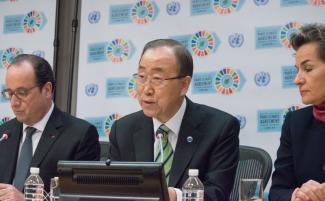Post-grad studies
Solving global problems

The PGP is based on academic knowledge and geared to providing policymakers with expert advice. Applicants must be from an EU member country and younger than 30. They must also have an excellent grasp of the German language.
All relevant kinds of professional work are taken into account:
- leadership in a government department (such as, for example, Germany’s Federal Ministry for Economic Cooperation and Development) or other state agencies;
- management of projects (for example at the development bank KfW or the GIZ); as well as
- working for private-sector consultancies such as GFA in Hamburg or GOPA in Bad Homburg.
All of these institutions need experts that are willing to think outside the box, tackle questions from other academic disciplines than their own and rise to complex management challenges in multi-cultural settings.
Learning – debating – problem solving
The curriculum’s first phase lasts nine weeks, during which DIE scholars convey fundamental theory insights on the basis of empirical case studies. Debates with experienced policymakers and top-level civil servants complement these lessons, emphasising issues of practical relevance. This phase ends with a three-day simulation of intergovernmental talks, with staff from BMZ, GIZ and KfW serving as experts.
During the second phase, which lasts 11 to 12 weeks, the 18 students form three research groups and prepare for empirical research. Each group is guided by a DIE scholar and must cooperate closely with a partner institute in the country where its field research will take place. The research results must serve the interests of that partner institute, for instance by providing expert advice to German or other European policymakers – the very people the young professionals will work for after graduation.
The field research itself takes another 10 to 11 weeks. Participants spend that time at the partner institute as well as with cooperation partners in other places of the country concerned. The teams conduct extended in-depth interviews and analyse the qualitative data thus generated.
Personal growth
To cooperate intensively in a small group for an extended time requires good preparation and personal growth. Field research is more challenging than internships are. The team members, who have only recently met, must cooperate on creating, improving and maintaining a framework that allows them to achieve their goals. Accordingly, team-building seminars are part of the PGP. One of the major tasks for the research teams is to learn how to cooperate amongst eachother at personal and professional levels so the field research can become fruitful.
Applicants for the PGP must have a master degree, for example in economics, political science, global development studies, peace studies or related subjects. Many students have shown an interest in issues of global justice and equity since their youth and spent time as volunteers or interns in countries of the global south or nations transitioning from communist rule. They must speak English fluently and be able to converse in a second UN language or Portuguese.
By applying, postgrads indicate their interest in working for development agencies and their willingness to work abroad. Employers appreciate that, so job opportunities are good after graduation, even for those without prior professional experience in development affairs.
Regine Mehl
Link
Training at the DIE:
http://www.die-gdi.de/en/training/postgraduate-training-programme/













